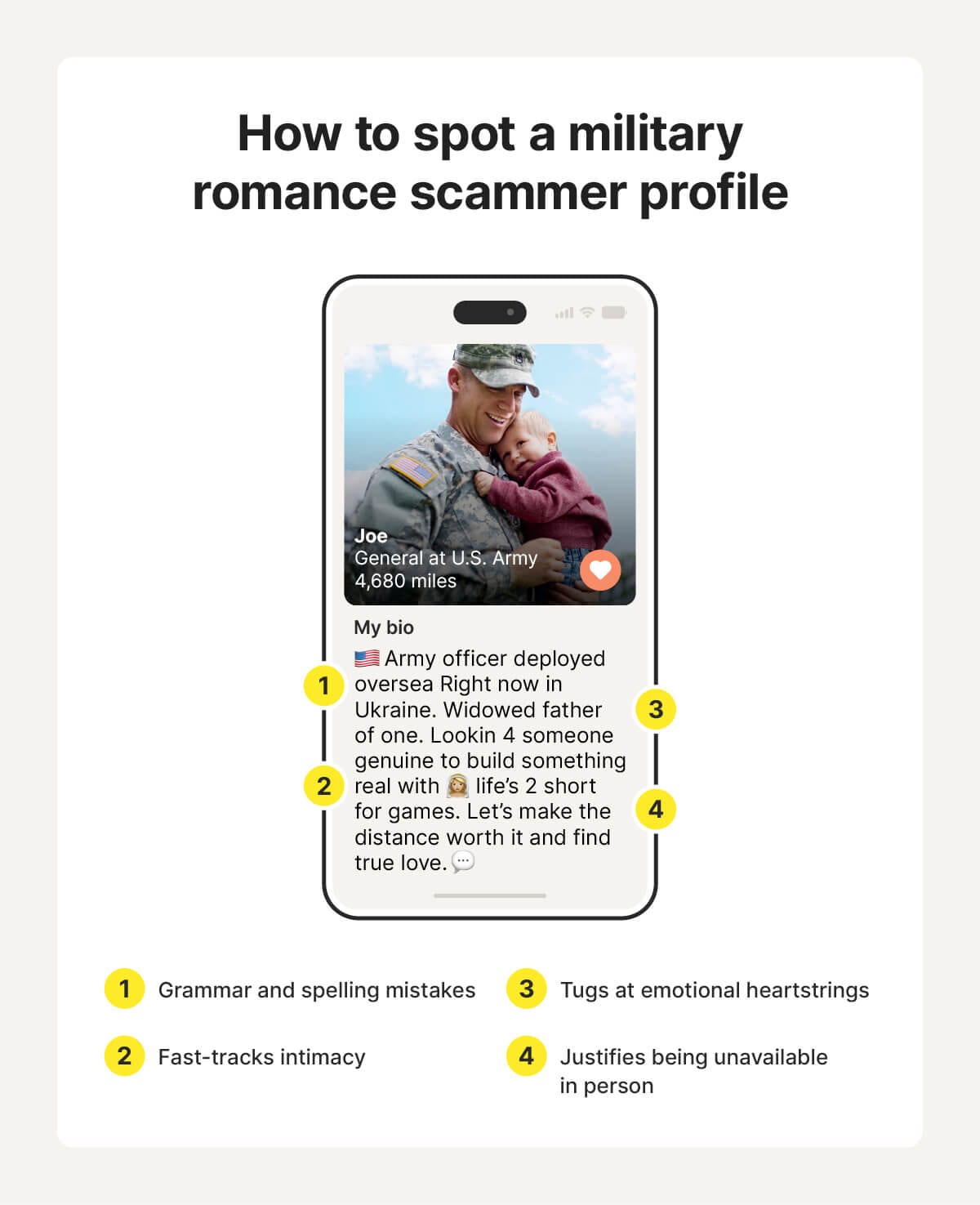“From time to time, he would tell me that it is so bad over there and he wants to see me before he dies, and that I can apply for leave for him to come and visit me.” - Reddit user who encountered a military romance scam
Online dating has created countless connections, but it’s also given scammers new ways to exploit emotions. In late 2024 alone, 1 in 4 daters reported being targeted by romance scams. Increasingly, these fraudsters pose as military personnel to win your trust, extract money, or steal personal data.
Learn how these scams work, the red flags to watch for, and how to protect yourself from identity theft and financial loss.
What are military romance scams?
Military romance scams are a type of online dating fraud where scammers pose as active-duty service members to build trust, spark romantic connections, and ultimately trick you into sending money or sharing sensitive data.
To make their stories more convincing, these scammers often steal photos from real service members or use AI-generated images to create a fake profile. They may claim to be deployed overseas to explain why they can’t meet in person and to justify unusual financial requests.
Many of these scams start on dating apps like Hinge, Bumble, or Tinder, but they also appear on Facebook, Instagram, and other platforms, where scammers seek to prey on innocent users looking for a real connection.
How military romance scams work
Military dating scams exploit your respect for service members and play on your emotions to manipulate you into handing over money or private details. Here’s how these scams typically unfold:
- Go undercover: The scammer steals photos from real soldiers to create a fake dating profile that looks legitimate.
- Zero in on a target: They use dating apps or social media sites to seek out vulnerable and lonely people. Public posts that show support for the military can also put you on their radar.
- Break down your defenses: The scammer works fast to build an emotional bond, often “love bombing” or sharing heartfelt stories about their "deployment" to gain your sympathy. They’ll send daily messages, sometimes generated by AI, that are designed to make you feel close.
- Execute the mission: After you’re emotionally invested, they make a financial request. It might be money to help with an emergency or fees to submit a “leave request” to visit you. In some cases, they’ll push for personal details they can use to commit identity theft.
- Retreat and evade capture: As soon as the money stops flowing, they disappear and block you, leaving you heartbroken and out of pocket.


13 Military romance scam tactics and red flags
Fraudsters use an arsenal of tactics to build trust and exploit your emotions. Keep an eye out for these red flags to spot a military romance scam before it goes too far.
1. Requests for money
Scammers may prey on your sympathy to ask for money, claiming they need it for food, children back home, or to submit a “leave request” to visit you. Often, they will specifically request that you send the money via wire transfers, gift cards, cryptocurrency, or peer-to-peer payment apps because these methods are difficult to trace or reverse.
Here’s the intel: The military pays for food, housing, medical care, and transportation. Service members would never need outside financial help with such things.
2. Locked bank accounts
Military romance scammers may claim that they’re deployed overseas and locked out of their bank accounts to justify asking for money. Some may even ask for your banking details under the guise of transferring funds, putting you at risk of fraud.
Here’s the intel: Active-duty service members can access their bank accounts while deployed and may receive additional pay or allowances during that time. Any legitimate financial concerns should be handled directly through their bank or official military support channels.
3. Valuable package
Fraudsters may claim they were gifted a fortune of diamonds, jewelry, or cash while stationed overseas. They say they want to send it home so the two of you can start a luxurious life together. But first, they need your help covering shipping or customs fees to send the package to your address. Once the “package” is supposedly in transit, they’ll claim it’s been held up at customs and ask for even more money to get it released.
Here’s the intel: U.S. service members aren’t legally allowed to accept large gifts while deployed, and customs doesn’t randomly seize legitimate military shipments.
4. Excuses to avoid phone calls or video chats
Scammers often use a fake military status to avoid phone or video calls that could reveal their true identity. They might claim that security restrictions prevent video chats or that poor internet in their deployment area makes calls impossible.
Here’s the intel: While communication may be limited, service members typically have opportunities to make calls or video chat during downtime. If someone messages you frequently but always has an excuse not to talk, it’s a clear red flag.
5. Love bombing
Military romance scammers often move fast to create a false sense of intimacy and trust, so they can take your money and move on to the next target. They often use love bombing tactics like saying “I love you” early on, calling you their soulmate, or even talking about marriage after just a few conversations.
Here’s the intel: Love bombing is a manipulation tactic designed to build trust fast and cloud your judgment, making it easier for scammers to take advantage of you.
6. Off-platform messaging
Since most dating platforms have systems that can flag suspicious behavior, scammers will usually try to move the conversation off of them quickly. They’ll ask to text, email, or chat on WhatsApp instead to stay under the radar.
Here’s the intel: Stick to the dating app for as long as possible. Be cautious of anyone in a rush to move the chat to another app.
7. Ransom demands
In this version of the scam, the fraudster claims they’ve been kidnapped or are in danger. They’ll take advantage of your feelings for them, saying they need you to send money for a ransom to ensure their safe release.
Here’s the intel: Military protocols protect real service members. If something were to happen, their families would be notified through official channels, not a message to a stranger begging for money.
8. Unrealistic availability
If someone claiming to be on active duty is constantly online, messaging you at all hours, or carrying on long conversations every day, that should make you think twice.
Here’s the intel: Real service members have strict schedules and limited downtime, especially while deployed.
9. Fake or sparse social media
If a scammer is using a fake profile, you’ll likely find little or no digital footprint. Their accounts may also feature photos that look staged or model-like, often reused from elsewhere online. Clear signs of a fake social media account include:
- Overly polished images.
- Few or no posts.
- No tagged posts.
- Low friend or follower count.
- Duplicate profiles.
Here’s the intel: Members of the military can have social media pages just like civilians.
10. Medical emergency claims
A common manipulation tactic used by scammers is inventing medical emergencies involving themselves, a child, or a family member to evoke sympathy and pressure you into sending money. Some may even claim they were injured in combat and can’t get treatment until you provide financial help.
Here’s the intel: Members of the U.S. military and their families get health coverage through the TRICARE program. Active-duty service members typically receive free care at military treatment facilities (MTFs).
11. Too many details
While vague stories can raise suspicion, oversharing can be just as telling. If someone you met online rattles off tons of details, like their exact deployment location or specific dates, that’s a sign they’re likely a scammer trying a bit too hard.
Here’s the intel: Real military personnel are trained to avoid sharing exact locations and timelines during deployments since doing so may violate Operational Security (OPSEC) guidelines.
12. Military ID photos
To appear legitimate, scammers may post a photo of a military ID on their profile or send one directly to gain your trust. While this might seem convincing, it’s actually a major red flag.
Here’s the intel: It’s illegal to take a photo of a military ID card, and it’s unlikely a genuine service member would ever do so.
13. 2+ year deployment claims
Some military romance scammers play the long game, building trust over months or even years, while slowly draining money from their targets. They may claim they’re on a deployment lasting over two years to justify never meeting in person.
Here’s the intel: Most military deployments last between 90 days and 15 months, and service members are typically granted leave between deployments.
How to protect yourself from military romance scammers
Protecting yourself from military romance scams starts with approaching online connections with caution. Move slowly, trust your instincts, and take steps to verify someone’s identity before you get too invested.
Here are some tips to help you stay safe:
- Review their photos and social media: Run a reverse image search through Google Images to see if their pictures are stolen, and look for signs that their social media profiles may be fake.
- Place video calls to confirm who they are: Fraudsters launching military catfish scams avoid showing their face, so tread carefully if they refuse to video chat or if their appearance doesn’t match the photos.
- Verify their military story: Ask specific questions about their rank, unit, or deployment details, and look out for details that don’t add up.
- Take it slow: Scammers often express love or deep feelings quickly to lower your guard and cloud your judgment.
- Stay on the dating app: Don’t switch to private messaging apps right away. Scammers often encourage this to avoid platform monitoring.
- Never send money or personal information: Any request for money or personally identifiable information (PII) from someone you’ve never met is nearly always a scam.
- Talk to someone you trust: When emotions are high, it’s easy to miss warning signs. A friend or family member can help you identify a scammer before things go too far.
- Consider identity theft protection: Protect your identity from military romance scams with identity theft protection services like LifeLock.
What to do if you get scammed
If a military romance scammer targets you, act quickly to protect your finances and identity. Here’s what to do:
- Stop all communication: End all contact with the scammer immediately. Attempting to negotiate with the scammer won’t help recover lost funds.
- Save evidence: Take screenshots and keep records of all messages, images, and transaction details.
- Report the scam to the platform: Flag the scammer’s profile on the dating site.
- Contact your bank: Notify your financial institutions as soon as possible. They may be able to stop a transaction or refund scammed money.
- Report fraud to law enforcement: File a report with the Federal Trade Commission (FTC), and consider contacting your local police depending on the situation.
- Consider a credit freeze: If you shared sensitive information, a credit freeze can help prevent identity theft.
- Change your passwords: If you exposed login credentials, update them immediately and follow strong password security practices — use unique, complex passwords for each account.
- Monitor your finances and credit: Keep a close eye on activity, and consider using a credit monitoring service like LifeLock for ongoing protection.
- Seek emotional support: Scams can be emotionally draining, so reach out to friends, family, or a counselor to help process the experience.
Shield yourself from military romance scams
Military romance scammers can do more than break your heart and empty your bank account — they can steal your identity, too.
LifeLock helps protect against identity theft with credit and data monitoring, real-time alerts, and U.S.-based restoration specialists ready to help recover stolen funds and restore your peace of mind.
Editor’s note: Our articles provide educational information. LifeLock offerings may not cover or protect against every type of crime, fraud, or threat we write about.
Start your protection,
enroll in minutes.
LifeLock is part of Gen – a global company with a family of trusted brands.
Copyright © 2026 Gen Digital Inc. All rights reserved. Gen trademarks or registered trademarks are property of Gen Digital Inc. or its affiliates. Firefox is a trademark of Mozilla Foundation. Android, Google Chrome, Google Play and the Google Play logo are trademarks of Google, LLC. Mac, iPhone, iPad, Apple and the Apple logo are trademarks of Apple Inc., registered in the U.S. and other countries. App Store is a service mark of Apple Inc. Alexa and all related logos are trademarks of Amazon.com, Inc. or its affiliates. Microsoft and the Window logo are trademarks of Microsoft Corporation in the U.S. and other countries. The Android robot is reproduced or modified from work created and shared by Google and used according to terms described in the Creative Commons 3.0 Attribution License. Other names may be trademarks of their respective owners.







